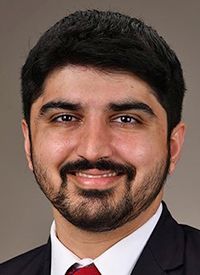Article
Hypertension Linked With Worse Outcomes for Patients With Upper Tract Urothelial Cancer Undergoing Nephroureterectomy
Author(s):
Hypertension was found to be an independent risk factor for worse survival outcomes in patients with upper tract urothelial cancer undergoing radical nephroureterectomy.
Sohail Dhanji, MD

Hypertension was found to be an independent risk factor for worse survival outcomes in patients with upper tract urothelial cancer undergoing radical nephroureterectomy, according to data presented at the 2023 American Urological Association Annual Meeting.
“The impact of hypertension on this patient population is uncertain, and so we sought to investigate this relationship through a retrospective multicenter analysis using our ROBUUST [ROBotic surgery for Upper tract Urothelial cancer Study] registry with 20 centers,” explained first author Sohail Dhanji, MD, clinical research fellow at the University of California, San Diego School of Medicine Department of Urology.
The investigators evaluated a total of 865 patients, 488 of whom had hypertension and 377 who did not have hypertension. Mean follow-up was 30.5 months. Primary outcome was all-cause mortality/overall survival, and secondary outcomes included recurrence/recurrence-free survival.
Significantly higher rate of high tumor grade was observed in patients with hypertension compared with patients without hypertension (78.5% vs 69.5%, P = .005). The investigators did not observe significant differences for 30-day complications (patients with hypertension, 17.9% vs patients without hypertension, 1.9%; P = .989) or positive margin rate (patients with hypertension, 5.3% vs patients without hypertension, 4.8%; P = .713). Patients with hypertension had significantly lower estimated blood loss at 148 mL vs 167 mL in patients without hypertension (P = .038).
Per multivariate analysis, hypertension was found to be an independent risk factor for all-cause mortality (HR: 1.84, P = .13), cancer-specific mortality (HR: 2.33, P = .012), and recurrence (HR: 1.41, P = .022). In addition, positive margins were revealed to be an independent risk factor for all-cause mortality (HR: 2.09, P = .022) and cancer-specific mortality (HR: 3.20, P = .002). pN1 status was an independent risk factor for both all-cause mortality (HR: 3.20, P = .008) and cancer-specific mortality (HR: 6.68, P = .001).
Dhanji reported that 3-year overall survival was 66.9% in patients with hypertension vs 79.8% in patients without hypertension (P = .003), and 3-year recurrence-free survival was 48.8% in patients with hypertension compared with 60.6% in patients without hypertension (P = .032).
“What we found is that hypertension is an independent risk factor for worsened survival outcomes and mortality outcomes across the board on multivariable and Kaplan Meier analysis,” Dhanji said.
During his presentation, he also reported that Kaplan Meier analysis showed that patients with hypertension had significantly worse 3-year overall survival as well as recurrence-free survival.
Asked what the take-home message from the abstract would be, Dhanji said, “I would say that controlling blood pressure is extremely important for the survival of patients with upper tract urothelial carcinoma, especially when undergoing radical nephroureterectomy.”
Dhanji added that further research is warranted to confirm his group’s findings and uncover mechanisms of action, and also “to improve outcomes with improved hypertension control.”
Reference
Dhanji S, Liu F, Hakimi K, et al. Hypertension is associated with worsened oncological survival outcomes in patients undergoing nephroureterectomy for upper tract urothelial carcinoma: analysis of the ROBUUST registry. Presented at: American Urological Association Annual Meeting, April 28-May 1, Chicago. Abstract MP47-04









